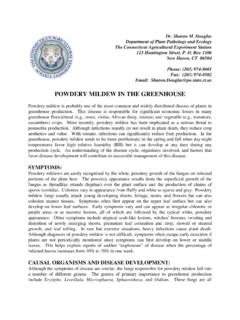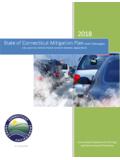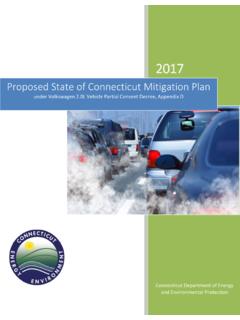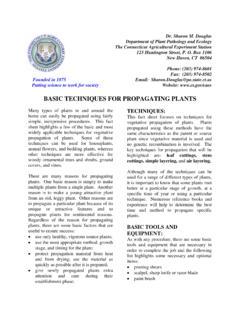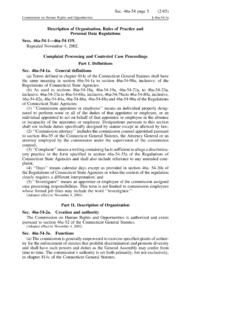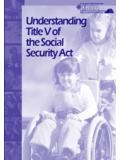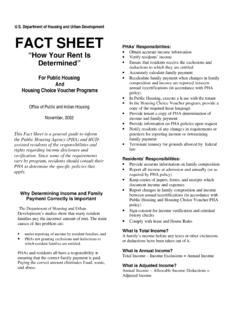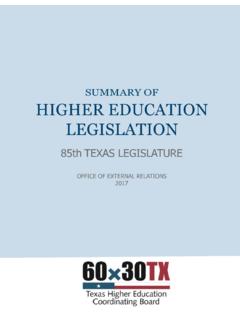Transcription of CONNECTICUT OFFICE OF EARLY CHILDHOOD
1 1/15 Rev. CONNECTICUT OFFICE OF EARLY CHILDHOOD . Head Start grant program July 1, 2015 to June 30, 2017. Legislative Authority CONNECTICUT General Statutes Section 10-16n RFP 086. Due Date April 24, 2015. MYRA JONES-TAYLOR. COMMISSIONER. The CONNECTICUT OFFICE of EARLY CHILDHOOD is committed to a policy of equal opportunity/affirmative action for all qualified persons. The OFFICE of EARLY CHILDHOOD does not discriminate in any employment practice, education program, or educational activity on the basis of race, color, religious creed, sex, age, national origin, ancestry, marital status, sexual orientation, gender identity or expression, disability (including, but not limited to, intellectual disability, past or present history of mental disorder, physical disability or learning disability), genetic information, or any other basis prohibited by CONNECTICUT state and/or federal nondiscrimination laws.
2 The OFFICE of EARLY CHILDHOOD does not unlawfully discriminate in employment and licensing against qualified persons with a prior criminal conviction. Inquiries regarding the OFFICE of EARLY CHILDHOOD 's nondiscrimination policies should be directed to: Levy Gillespie Equal Employment Opportunity Director/American with Disabilities Act Coordinator State of CONNECTICUT Department of Education 25 Industrial Park Road Middletown, CT 06457. 860-807-2101. The CONNECTICUT OFFICE of EARLY CHILDHOOD is an affirmative action/equal opportunity employer. Table of Contents I. Program Information and Requirements .. 1-4. Purpose .. 1. Background .. 1. Description of Areas of Funding .. 1-3. Conditions for Funding .. 3. Eligible Applicants .. 3. Grant Period .. 3. Funds Available .. 4. II. Application 5-6. Cover Sheet .. 5. Proposal Abstract.
3 5. Statement of Need, Objectives and Indicators .. 5. Proposed Services and 5. Evaluation .. 5. Collaboration .. 6. Budget 6. Budget Justification .. 6. Head Start Federal Monitoring Reviews (formerly PRISM) .. 6. Department of Health and Human Services-ACF Financial Assistance Award Letter .. 6. Statement of Assurances .. 6. Affirmative Action Packet .. 6. Date of Board Acceptance .. 6. III. Application Process .. 7-8. Obligation of Grantees .. 7. Freedom of Information Act .. 7. Management Control of the Program and Grant Consultation .. 7. Updating of Information .. 7. Definition of Terms .. 7. Due Date .. 8. Review of Proposal and Grant Awards .. 8. Other Program Requirements .. 8. IV. Review Criteria .. 9-12. V. Application Form .. 13-28. VI. Appendices .. 29-38. Appendix A. Budget Object Codes .. 29. Appendix B.
4 Affirmative Action Plan .. 32. Appendix C. Statement of Assurances .. 33. Appendix D. Head Start Services Simulated Allocations .. 38. Part I. Program Information and Requirements Purpose The State Head Start grant is intended to serve three purposes as specified in CONNECTICUT General Statutes (CGS) Section 10-16n: 1) To establish extended-day and full-day, year-round Head Start programs or expand existing Head Start programs to extended-day or full-day, year-round programs . 2) To enhance program quality. 3) To increase the number of children served. Head Start grantees must use the funds only to supplement and not to supplant, federal, state and/or local funds. All Head Start programs that receive funding under this grant must be in compliance with Federal Head Start Performance Standards. Background The CONNECTICUT OFFICE of EARLY CHILDHOOD (OEC) is committed to providing children greater access to high-quality preschool programs in an effort to reduce the achievement gap between the state's poorest students and their wealthier counterparts.
5 Research shows that access to high-quality preschool programs provide important foundational skills needed for educational success. Expanding services to Head Start eligible children will increase opportunities for promoting children's school readiness. More children can be engaged in high-quality preschool experiences that promote development in all domains of learning; language and literacy; the creative arts; mathematics; science; cognition; social studies; social and emotional development; and physical health and development. The provision of year-round programming to avoid a gap in learning can help children stay on target with developmentally appropriate skills. The OEC encourages grantees to submit proposals implementing collaborative approaches for service delivery with other community-based child care agencies, providers and funding sources.
6 Collaboration between Head Start, State School Readiness programs , Family Resource Centers, Even Start, Smart Start and other programs that support young children and families is encouraged. Grantees applying for funding to provide full-day, year-round services may consider seeking assistance from the Care 4 Kids Child Care Assistance Program. Grantees may propose to expand the part-day, center-based options they offer in order to serve additional children. Funding may also be used to enhance program quality. Description of Areas of Funding Head Start grantees are invited to submit applications under one or more of the following grant categories for which they are eligible: Services (16101-TANF formula calculation) Only Head Start grantees serving towns that had 900 or more children in the TANF program (as of June 30, 1996 Section 10-16n), may apply for Services funding (funding formula is subject to change).
7 1. The following towns are eligible for Services funding: Bridgeport Hartford New Haven Stamford Bristol Manchester New London Waterbury Danbury Meriden Norwalk West Haven East Hartford New Britain Norwich Windham Services (16101). Grantees/delegates are to use funds to increase the number of children served beyond the federally funded enrollment by providing full-day, year-round programs for additional children including summer programs . These programs must operate a minimum of six hours per day, five days per week and 180 days per year. The summer program must operate a minimum of hours per day, five days per week for five to eight weeks. Applicants proposing less than an eight-week program must explain in detail how this program will meet the needs of the community as documented by the program's community needs assessment or other detailed documentation that includes a narrative description of the supporting data.
8 Services provided must be center-based. Enhancement (16106). Grantees/delgates are to use funds to increase the number of children served beyond the federally funded enrollment by either extending the school day or year ( , increasing wrap-around programs ) or increasing enrollment in existing federally funded Head Start programs . Extending the day is defined as a program that is extended beyond the federally supported hour day to a 6. to 10 hour day. Children must attend an extended-day program for a minimum of 6 hours per day. Extended-year programs add weeks beyond those that are federally funded and include a five- to eight-week summer program (applicants proposing less than an eight-week program must explain how this program will meet the needs of the community as documented by the program's community needs assessment or other documentation that includes a narrative description of the supporting data).
9 The summer program must be in session for a minimum of five days per week for at least hours/day. Services provided must be center-based settings. or Grantees/delegates are to use funds to increase the number of children served beyond the federally funded enrollment by providing part-day, year-round programs for additional children, with or without a summer program. These programs must operate a minimum of hours per day, five days per week and 180 days per year. The summer program, if provided, must operate for a minimum of hours per day, five days per week for five to eight weeks. Applicants proposing less than an eight- week program must explain in detail how this program will meet the needs of the community as documented by the program's community needs assessment or other documentation that includes a narrative description of the supporting data.
10 Services provided must be in a center- based setting. and/or Grantees/delegates are to use funds to enhance program quality by providing opportunities to augment children's literacy/language and/or mathematical development. programs must directly address the Head Start Child Development and EARLY Learning Framework as well as the CT EARLY Learning and Development Standards (ELDS). 2. LINK (16202). Grantees/delegates are to use funds to decrease the achievement gap/preparation gap in CT through innovative and/or evidence-based strategies. Service delivery and strategies must be based on the results of a community needs assessment and focus on the children that have been identified as being the most vulnerable as defined in the Head Start Act ( , children experiencing homelessness, children in foster care, children with disabilities).




